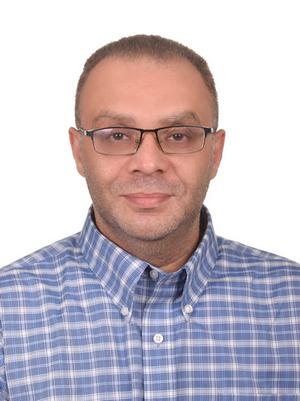Interview with longlisted author Ahmed El-Fakharani
27/02/2023

When did you begin writing Bar Lialina and where did the inspiration for it come from?
I began writing the novel at the end of 2018. It had begun as a short story with the title The Small Man, which I published on a literary website. In it, Nuh Al-Rahimi, the hero of the novel, meets Yusri Al-Hilu, an editor-in-chief, after reading his articles about small men, based on Wilhelm Reich’s book. He confesses to him that he is the small man, and he has come to learn how he can become a big, more intelligent and less foolish man. Later, the story developed and the character of Nu’amat, female owner of the bar, came along. Then the long bar chapter with just the clever people, which includes most of the novel’s events and main conflicts.
I think that the failure of the January revolution was the source of inspiration, if one can use that expression. I felt frustrated, and had to wonder, were those who led or were at the forefront of the revolutionary scene and in whom I believed, intelligent as they claimed? Did they really understand the slogans which they upheld, or were they merely repeating them, parrot-like? I thought about how they sometimes behaved, seeing intelligence as a layer separating them from stupid people, who in their view were everyone apart from themselves. I considered how progressive ideas in the hands of the “intelligent” were no longer a means of searching for the truth, but a diligent effort to blind people to that truth, as though truth no longer mattered, only certain meaningless types of behaviour. But the essential question of the novel remains, as in most of my books, what makes our existence genuine or false?
The challenge before me was how to construct an entire novel from what is vulgar and clichéd, since they are the best expressions of that world. How could I build characters who claimed to be deep but only reveal their superficiality and external characteristics, while the important questions are voiced by the character of the small, stupid man, the only one who realises what reality is and stops pretending. Or, to borrow the expression of someone who has written about the novel, “how could I construct true meaning from a building of fragile lies”. It was an important experience for me. It was fun and pleasurable to give myself full rein, and also painful, as writing can be.
Did the novel take long to write and where were you when you finished it?
I wrote it in three years but stopped halfway through when I moved from one city to another. The idea hadn’t matured enough. I finished another novel called Taming the Dog, which was published in 2021. When I’d sent off the complete manuscript of that book, I returned to Bar Lialina. I found that the idea had matured, and I went back and completed the writing. When I began the novel, I was living in Cairo and when I finished it, I was in Dahab, south of the Sinai. I’ve lived there since mid-2019, until I left it four months ago.
Do you have writing rituals?
In normal circumstances, I read in the morning. If I have a project for a novel, story or short text and the basic elements of it are clear in my mind, I usually write in the evenings, after midnight until five in the morning. If I am unable to write, I spend the rest of the time reading.
What is your next literary project after this novel?
I have a completed novel which may be published in the middle of this year. It attempts to question the future of the art of the novel itself. I also have a short story collection which I have been writing off and on for many years, and a book of literary criticism about the technique of the story story, based on an analysis of seven short stories by Naguib Mahfouz, Yusuf Idris, Mohamed Makhzangi and Ibrahim Aslan, but I don’t know when it will be published. It depends on when problems related to the intellectual property of the stories will be resolved.
At the moment, I am experimenting with new styles and ways of writing, and I don’t know what will result from that. It may be a novel, or it may not. I never stop thinking about writing, all the time. Occasionally, one must stop to think radically about questions to do with writing and reading. I think I need to try out different forms of expression, whether they are within the same literary genre, the novel, or not.
